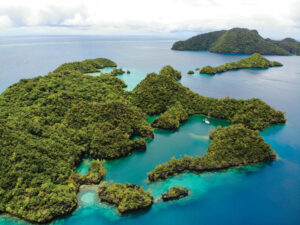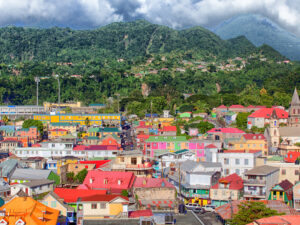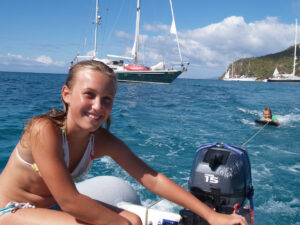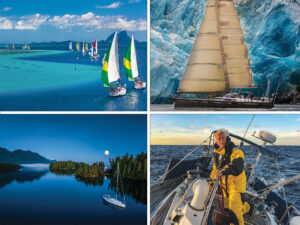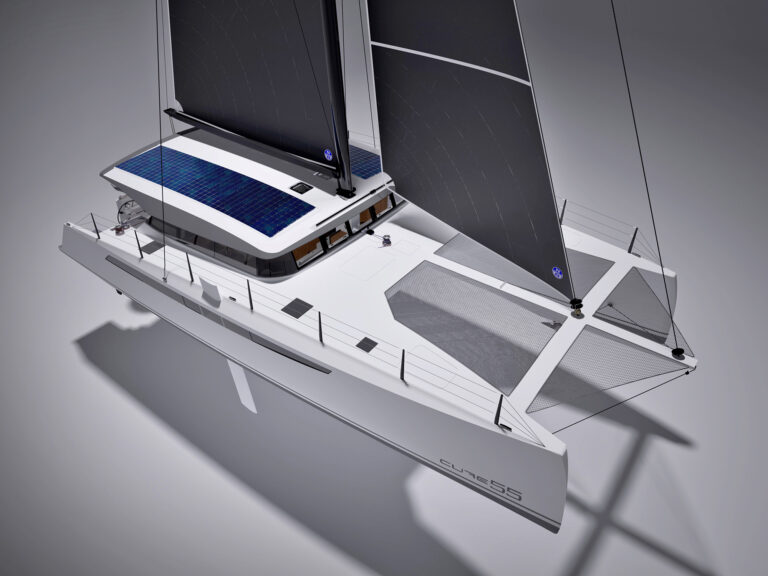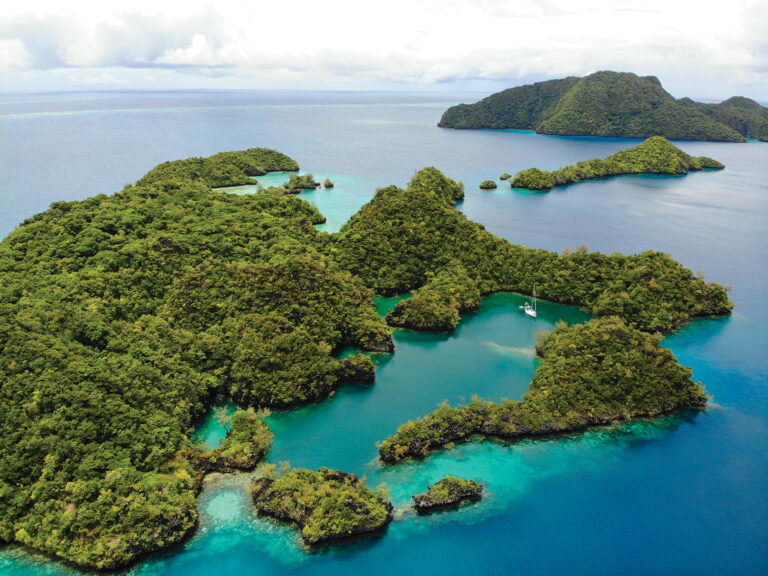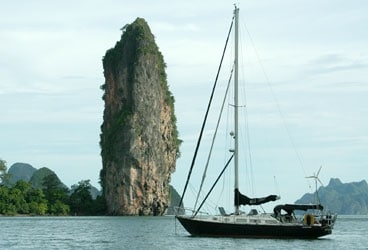
Honeymooners 368
Knowing the precise moment at which an important life-changing event takes place is sometimes difficult, especially on a sailboat: Daily shipboard routine has no bookmark, no laugh track, no freeze frame to commemorate the exact time of our triumphs or tragedies. But it might’ve happened for me with Christian on the morning of the third day of our Thailand cruise. Our 38-foot S&S-designed Hughes sloop, Wild Card, was already under way when I realized that a knot had worked its way into our dinghy painter.
“Christian,” I said to my freshly-minted son-in-law, “I’m gonna take the strain while you untie it, OK?”
“Sure,” he said.
It wasn’t a complicated job. There were no mistakes. He wasn’t particularly heroic. I certainly imparted no great wisdom. Just two very different men, brought together by one very special woman, doing a simple, mechanical task for the mutual benefit of their watery tribe.
It’s the small, unremarkable events that make up the velvet chains of family, isn’t it?
I’ve never seen my wife, Carolyn, happier. Our daughter, Roma Orion, a third-generation liveaboard when she left for Brandeis University in 2000, was back aboard. We were a complete family again. Even better, we had an eager new crewmember: Christian Rojas, our daughter’s Colombian-born, German-nurtured, British-raised, Spanish-kissed, Austrian-scented, newly naturalized-American husband. (“It’s like marrying the United Nations,” Roma says.)
Most parents aren’t asked by their newlywed daughter and her grinning groom if they can honeymoon with them-but we Goodlanders aren’t “most parents,” are we?
When Roma first suggested chilling out from their nuptials by cruising with us for a couple of weeks, it wasn’t easy to decide just what country and sailing venue would be best. We were in the lonely, windswept Federated States of Micronesia at the time.
We thought that the distances between these tiny Pacific islands and their potential for heavy weather were both too great. They were utterly mesmerizing, true, but not user-friendly. The Philippines were our next stop, but the poverty and corruption ashore could put a damper on things afloat. Obviously, we wanted this get-acquainted cruise to be perfect-as perfect, at least, as two goofy, nutty, wind-blown, tie-dyed, salt-stained parents such as ourselves could manage.
So the Philippines and Micronesia were out.
Forget the hyperspeed of commerce-clogged Hong Kong. Indonesia is a wonderfully diverse and exciting destination, but it’s too politically volatile and potentially violent. Nix on Vietnam because of its systemic corruption and lack of due process. Ditto Cambodia. As for Myanmar, a.k.a. Burma-well, not until the courageous, Nobel Peace Prize-winning, under-house-arrest-so-long-her-house-is-falling-down Aung San Suu Kyi walks free among her liberated people!
This left Malaysia as a strong possibility. We love the Malays, a kind, gentle people. We always feel perfectly safe and very welcome there. The country has a million good harbors, and air transportation is excellent-but the problem with Malaysia is that it’s so civilized and economically advanced a global destination that you don’t feel you’re really somewhere exotic.
Also, Islam is the official religion of Malaysia, and public displays of physical affection (called khalwat, an Arabic word meaning “close proximity”), including sitting too close-are strictly against the law. Even Carolyn and I, after 38 years of wedded bliss, have to be careful when sitting on a romantic, flower-canopied park bench at the Lumut Yacht Club not to forget ourselves. And I’m afraid our two newlyweds were exactly that and couldn’t go more than 10 seconds or so without severely offending Sharia law.
This left tiny Brunei. We’d enjoyed our recent stay there immensely. The sultan is quite a dude, with his 64 Rolls-Royces, his flying force of 747s, his palace of 1,773 rooms, and his dining table that seats 4,000 on formal occasions. Not to mention his fleet of megayachts scattered through the world.
But there’s something eerie and spooky about Brunei. Downtown has everything a modern city should have: shopping malls, highways, street lights, even parking-meter maids. It only lacks a single ingredient: people. Oil money can mimic the free marketplace by purchasing its exact, picture-perfect façade, but it can never quite duplicate it.
Brunei seemed to us like the movie set of the 1960’s TV show The Prisoner, starring Patrick McGoohan-a bit too weird and surreal to be true.
So Carolyn and I decided, after careful consideration, to host the newlywed charter in the most dramatic, most unusual, most visually exciting, most breathtaking place to sail on this planet-Phangnga Bay, in Thailand.
It’s difficult to describe the otherworldly beauty of Phangnga Bay, the northern end of the body of water that lies between the resort island of Phuket and mainland Thailand. It’s as if you’ve sailed to another planet or another geological dimension. The water there is shallow. Because the bay is landlocked, there’s no swell or sea, just perfectly flat, calm water. There are hundreds of deserted islands, each one boasting a perfect anchorage on one side, depending on whether the nor’east or sou’west monsoon is blowing.
Except for the well-traveled trench between Ko Phing Kan-known locally as James Bond Island since The Man with the Golden Gun-and Phuket, the bay is completely devoid of cruising yachts. We occasionally spotted a sail on the horizon, but we never shared an anchorage with another yacht.
But it isn’t the sailing or the water that’s so unique in Phangnga; it’s the islands-the improbable rocks themselves.
I’m not a geologist, but here’s a Fatty-ized version of what happened long ago: Volcanic eruptions happened many times beneath a shallow bay of water, repeatedly shooting lava and molten rocks through the water and into the air. It rained large rocks and small islands in Phangnga Bay. Different types of rocks and minerals got mixed together and were spray-gunned everywhere. Eventually, things settled down. Millions of years passed. The softer rocks wore away first, leaving giant caves and open spaces at sea level. Then another eruption nearby bumped all the islands up about 25 feet. The sandstone bases of the thinner islands then eroded even more, leaving needlelike rocks jutting toward the sky with bases narrower than the tops-like giant, old-fashioned iron nails tossed into the placid, smoking sea by a crazy, demented god.
Caves are everywhere. Giant, nearly endless caves. Some you can swim into. For others, you need the dinghy. Some can be reached on foot. Bats abound, as do large lizards, iguanas, monkeys, poisonous snakes, gibbons, too.
There are almost no villages. Occasionally, a grinning fisherman in a longtail, a canoe powered by a small engine connected to a very long shaft, will zoom by and hold up his catch in hopes of a sale, but nothing else will disturb your peace. And a couple of bucks will buy you more live shrimp than you can possibly eat.
There are no docks, no marinas, no navigational aids, no nutt’n, which is exactly how we like it. A number of our anchorages were completely devoid of any manmade light at all. However, because Christian’s work-he’s a rising financial executive in an increasingly global company-requires him to be in constant touch with Holland, Germany, Spain, and the United States, we were never-alas-out of mobile-phone range.
The navigation in Phangnga bay is dead simple: Don’t hit the rocks below or above. There’s a lot of ’em, but they aren’t difficult to avoid. The mornings are usually calm. By midafternoon, there’s a freshening breeze with a westerly component. This builds until the early evening, when the seas politely go flat once again-which is all perfect when the focus is on the interior familial journey and not ocean sailing.
Our first passage, from Yacht Haven on Phuket to Ko Phanak, lasted all of three hours. We motorsailed most of it on port tack as the westerly breeze built. We had the hook down well before lunch. While Carolyn and Roma chatted and made fresh bread, Christian and I dashed ashore to go cave exploring.
One cave was large enough that we could drive the dinghy right in and beach it on the sandy spit within. I aimed my flashlight at the menacing, dripping, mineral-hued, many-ton objects hanging from the distant cave roof.
“Stalactites,” I said, “have to hold tight, while their lower counterparts,”-I shone my light at the almost identical yet inverted columns on the cave floor-“stalagmites, don’t.”
Occasionally, a bat would flick by, and we’d both duck like it was an Indiana Jones movie. We almost stepped on two giant, noisy-when-awakened lizards-which looked like prehistoric dinosaurs in the now-quivering white beams of our flashlights.
The farther we went, the more we lost the light from the cave entrance. Finally, we were wading through murky gloom. “I should’ve brought a ball of string to trail,” I mused uneasily under my breath. Finally we came to a fork in the tunnel. Somebody had been there before us-there was writing on the wall in Thai. “I wonder what it says,” Christian whispered. I pretended to read it. “On the left side it says ‘Certain death,’ and on the right side ‘Probably death,'” I reported.
“Let’s go with the latter,” he said, as he confidently took the lead. I gingerly followed, thinking, “He’s beating me at my own game!”
Carolyn is convinced it happened at our second, more northward anchorage of that first day, which was also in the lee of Ko Phanak. We’d spent a wonderful afternoon climbing cliffs, exploring caves, and swimming. Now it was evening and pitch-black outside. There were a million stars, many so close we had to be careful not to breathe on them. It was quiet. There were only natural sounds, such as the water gently lapping at our hull.
“Today, I saw a promiscuous monkey ashore,” I said, trying to sound as nonchalant as I possibly could.
Carolyn, despite knowing she was being drawn in, couldn’t resist. “I think you mean proboscis monkey,” she said.
“I know an X-rated scene when I see one,” I huffed. “But hey, I’m willing to be corrected. Let me amend that to ‘I saw a couple of promiscuous proboscis monkeys monkeying around today!'”
Christian laughed. Another point in his favor.
Then I tossed the remainder of my tea into the water on the starboard side. The bioluminescence was amazing. We oohed and ahhed. Then I shook the dinghy painter. An explosion of light! Carolyn splatted the boat hook-wow! Roma tossed in sea shells-yahoo!
It enthralled us for a long time, but eventually we tired of it. Christian quietly stole away to the port side to drain his bilge in privacy, but there’s no privacy on a 38-foot boat full of Goodlanders.
“Beautiful!” cried Carolyn, as the perfectly still water was filled with blue dancing diamonds. “Oh, wow!” said Roma. “Nice!” I had to admit.
Later, Carolyn said, “Funny how sailing helps families bond, eh?”
For Roma, the magic moment took place while she, Christian, and Carolyn were watching the anchor come up. “Asses and elbows,” I called. “I want to see only asses and elbows!”
This puzzled Christian until Roma explained that she and her mother had been hauling up anchors together for many years-and this was the first time she’d sailed with our “decadent” Maxwell windlass and could ignore my Captain Bligh rant.
The funniest moment came while Wild Card was anchored between Ko Kudu Noi and Ko Kudu Ya. My black swimming trunks and the black swimming trunks I’d lent Roma both had tired elastic. I was scraping barnacles. Christian had been talking to Roma, then swam off. We’d both been diving to remove the lower barnacles on the keel, and somehow we’d changed sides. I saw Christian swim back, looking down. He was behind me. Then I felt my drooping swim trucks hitched up and a little squeeze.
Now, I’m a liberal guy. I believe in live and let live. But even I have limits. And being patted on my-.
I abruptly turned and glared at my startled son-in-law.
“Oh, my god!” he blurted out, wide-eyed and red-faced. “I thought it was Roma! Sorry, Mister Goodlander!”
From then on, just before entering a restaurant or a dark tunnel or getting into the dinghy, I’d say loudly, as Carolyn and Roma giggled, “Just don’t grab my butt, Christian!”
Of course, I’d sternly promised myself not to judge my new son-in-law but to merely enjoy him. But what man is so perfect he can put away the yardstick on his daughter’s spouse?
Carolyn would come into the cockpit, and he’d move to allow her more room. Somebody’s coffee cup would be empty, and he’d dash below to fetch a refill. If Roma needed a cushion, he’d offer the one on which he was sitting. He didn’t ask if the dishes needed doing, he just did them. He wasn’t just polite. He was nice.
I taught him how to coil a line. My cockpit was never neater.
Our ancient two-horse outboard is finicky. He mastered the complicated start-up sequence the first time.
He never resented anything I told him, and I never had to tell him anything twice.
I was amazed to discover that I didn’t just like him-I admired him. By dint of hard labor and perseverance, he’d risen to the boardrooms of America by working two jobs, studying English at night, and earning an M.B.A.
He is, without doubt, the embodiment of the American Dream.
And he kept his sense of humor when I’d prod him with such questions as “Why waste your life ashore?” and “Is it true that you have an income addiction?” and “Didn’t grad school seem a bit, well, educationally excessive?”
I really don’t know when Christian became family, only that he did. And that it happened before we scrubbed Wild Card’s bottom together. How do I know? Because, later that evening, after they’d all had a few beers and I’d caught a contact high, I was telling them around the galley table after a feast that “it was the fastest, most aggressive barnacle I’ve ever seen, and I only turned my back on the evil crustacean for a mere nanosecond. It slid over and took my whole foot into its mouth! I tried to pull my foot out and swim for the surface-but no luck! Just as I was about to lose consciousness, when I could see the White Light and King Neptune slowly approaching, Christian dove down with a huge machete and started savagely hacking away at the screaming beast.”
They were all laughing when Christian blurted out, “Your dad is so full of it, Roma!”
Which made us laugh harder. He finally had my number! And I had his.
The Goodlanders continue to ping-pong between Malaysia and Thailand.
Thailand: harbors, sailing, charters
Language and the Wrong DVDs to Bring
Once outside of the cities, few Thais speak English. Yet communication is easy in the Land of Smiles-all you have to do is keep grinning. The gender of a speaker, however, is important. For instance, to say hello, Carolyn would say, “Sawat-dii kha,” but I would say, “Sawat-dii khrap.” To indicate thanks, s female says, “Khawp khun kha”; a man says, “Khawp khun khrap.” Mai pen rai, however, is casual and doesn’t change with the gender of the speaker-and it means “No problem!,” which is nearly always true in Thailand.
The Thais are the most polite people on Earth. During a recent demonstration in Bangkok, Carolyn and I were amused to see protesters, forcibly breaking through the gates of parliament to seize control of the building, stop to offer to their enemies a wai, the slight bow of Thai salutation in which both hands are pressed together respectfully.
There’s only one way to get yourself in trouble in Thailand: criticize the king. This is an absolute no-no. He is revered as a living god. Just be careful: Transporting a DVD of the movie The King and I, starring Yul Brenner, will get your boat confiscated instantly.
Good Harbors and Bad
Ao Chalong, the main harbor in Phuket, is well protected in all weather. But it’s busy with commercial traffic, and the anchorage is both crowded and dangerous, especially since large Thai vessels often begin dragging their rock anchors if the wind gusts over six or eight knots.
We used to anchor here-until the bars and brothels started to outnumber the religious shrines and wats, Buddhist compounds in which men and women can be ordained, respectively, as monks and nuns. Now we hang out at the northern end of the island, anchored in the channel at Laem Phrao. This is near the Yacht Haven marina, which allows us complete use of its facilities-dinghy dock, security, pool, gym, cable TV, and anchorage-wide WiFi-for the magnificent sum of US$15 a month. That’s not a misprint. Numerous tiny Muslim restaurants ashore offer a basic dinner for US$1.50 and a feast for US$4.
Marinas also exist at the Phuket Boat Lagoon and Ao Po Grand Marina, but anchoring is discouraged there.
Weather
Generally, winds off Thailand are light. In the summer, which runs from June to October, the sou’west monsoon blows, and in winter, from November to February, the nor’east monsoon kicks in. Depending on the season, you can get anywhere in the northern Indian Ocean-to or from Thailand, via the Andaman Sea-by sailing downwind! Most sailing craft on circumnavigations get to Thailand (via Bali, in Indonesia) in November and leave for Sri Lanka in January. Hurricanes are almost nonexistent, although this might be changing. August and September are in the rainy season.
Chartering in Thailand
Sunsail Sailing Vacations (www.sunsail.com) is active in Southeast Asia. Besides bases on Koh Chang and Koh Samui, in the Gulf of Thailand, and on the mainland at Phuket, fronting on the Andaman Sea, the company has a base on the Malaysian island of Langkawi (it’s 130 miles from Phuket) and can offer longer, one-way charters.
Other charter companies with boats in the region include Dream Yacht Charter (www.dreamyachtcharter.com), Elite Yachting (www.elite-sail-dive.com), Latitude 8 (www.latitude8yachts.com), Charter Yacht Sailing (www.charter-yacht.com), and Siam Sailing (www.sailing-charter-thailand.com).
F.G., with Elaine Lembo

